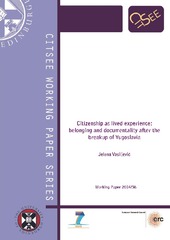Citizenship as lived experience : belonging and documentality after the breakup of Yugoslavia
Апстракт
Citizenship is usually thought of in terms of legal and political parameters setting the conditions for individuals’ statuses and rights, and so has been the case in its application to the post-Yugoslav context. With the primary interest in the “top-down” perspective, citizenship has been described as a tool with which new states regulated their respective citizenship bodies. But, equally, by granting us documents (passports, birth and marriage certificates, IDs, etc.) which connect us to a wider community, and by employing an array of ethnic, cultural and state symbols, citizenship instills us with a sense of belonging, membership and identity. Furthermore, through our enacting of rights and duties of citizenship, it becomes an inextricable element of our everyday experience. It is especially when questioned and contested that citizenship plays a significant role in how we perceive ourselves, how we appear to others and how intergroup relations are mediated. This paper focuses on pers...onal narratives that reveal lived experiences of the triangular relationship between citizenship, identity and (national) belonging in the post-Yugoslav space. Its aim is to shed some light on a less examined perspective of citizenship transformations, and to complement the currently existing literature on citizenship regimes in the post-Yugoslav states with a bottom-up approach that treats citizenship in its identity-forming and recognition-bearing social role.
Кључне речи:
citizenship / post-Yugoslav states / life stories / belongingИзвор:
2014Издавач:
- Edinburgh : CITSEE
Финансирање / пројекти:
- CITSEE - The Europeanisation of Citizenship in the Successor States of the Former Yugoslavia (EU-FP7-230239)
Колекције
Институција/група
IFDTTY - JOUR AU - Vasiljević, Jelena PY - 2014 UR - http://rifdt.instifdt.bg.ac.rs/123456789/1291 AB - Citizenship is usually thought of in terms of legal and political parameters setting the conditions for individuals’ statuses and rights, and so has been the case in its application to the post-Yugoslav context. With the primary interest in the “top-down” perspective, citizenship has been described as a tool with which new states regulated their respective citizenship bodies. But, equally, by granting us documents (passports, birth and marriage certificates, IDs, etc.) which connect us to a wider community, and by employing an array of ethnic, cultural and state symbols, citizenship instills us with a sense of belonging, membership and identity. Furthermore, through our enacting of rights and duties of citizenship, it becomes an inextricable element of our everyday experience. It is especially when questioned and contested that citizenship plays a significant role in how we perceive ourselves, how we appear to others and how intergroup relations are mediated. This paper focuses on personal narratives that reveal lived experiences of the triangular relationship between citizenship, identity and (national) belonging in the post-Yugoslav space. Its aim is to shed some light on a less examined perspective of citizenship transformations, and to complement the currently existing literature on citizenship regimes in the post-Yugoslav states with a bottom-up approach that treats citizenship in its identity-forming and recognition-bearing social role. PB - Edinburgh : CITSEE T1 - Citizenship as lived experience : belonging and documentality after the breakup of Yugoslavia UR - https://hdl.handle.net/21.15107/rcub_rifdt_1291 ER -
@article{
author = "Vasiljević, Jelena",
year = "2014",
abstract = "Citizenship is usually thought of in terms of legal and political parameters setting the conditions for individuals’ statuses and rights, and so has been the case in its application to the post-Yugoslav context. With the primary interest in the “top-down” perspective, citizenship has been described as a tool with which new states regulated their respective citizenship bodies. But, equally, by granting us documents (passports, birth and marriage certificates, IDs, etc.) which connect us to a wider community, and by employing an array of ethnic, cultural and state symbols, citizenship instills us with a sense of belonging, membership and identity. Furthermore, through our enacting of rights and duties of citizenship, it becomes an inextricable element of our everyday experience. It is especially when questioned and contested that citizenship plays a significant role in how we perceive ourselves, how we appear to others and how intergroup relations are mediated. This paper focuses on personal narratives that reveal lived experiences of the triangular relationship between citizenship, identity and (national) belonging in the post-Yugoslav space. Its aim is to shed some light on a less examined perspective of citizenship transformations, and to complement the currently existing literature on citizenship regimes in the post-Yugoslav states with a bottom-up approach that treats citizenship in its identity-forming and recognition-bearing social role.",
publisher = "Edinburgh : CITSEE ",
title = "Citizenship as lived experience : belonging and documentality after the breakup of Yugoslavia",
url = "https://hdl.handle.net/21.15107/rcub_rifdt_1291"
}
Vasiljević, J.. (2014). Citizenship as lived experience : belonging and documentality after the breakup of Yugoslavia. Edinburgh : CITSEE .. https://hdl.handle.net/21.15107/rcub_rifdt_1291
Vasiljević J. Citizenship as lived experience : belonging and documentality after the breakup of Yugoslavia. 2014;. https://hdl.handle.net/21.15107/rcub_rifdt_1291 .
Vasiljević, Jelena, "Citizenship as lived experience : belonging and documentality after the breakup of Yugoslavia" (2014), https://hdl.handle.net/21.15107/rcub_rifdt_1291 .



